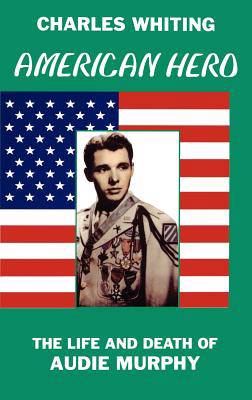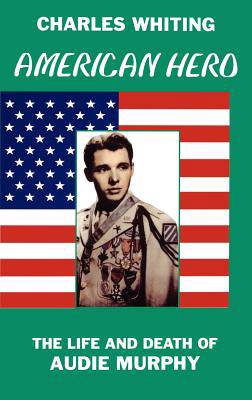
- Afhalen na 1 uur in een winkel met voorraad
- Gratis thuislevering in België vanaf € 30
- Ruim aanbod met 7 miljoen producten
- Afhalen na 1 uur in een winkel met voorraad
- Gratis thuislevering in België vanaf € 30
- Ruim aanbod met 7 miljoen producten
Zoeken
American Hero. The Life and Death of Audie Murphy
Life and Death of Audie Murphy
Charles Whiting
Hardcover | Engels
€ 25,45
+ 50 punten
Omschrijving
In a major new biography, veteran military historian and WII biographer, Charles Whiting combines both talents to tell the tale of barefoot Texan share-cropper's son, who could barely read and write, but became not only the US Army's most decorated soldier in its 250 - year history, but also the star of forty Paramount produced movies: most of which are shown on TV screens around the world to this very day. The gentle-eyed, baby-faced hero had won every decoration the United States had to offer before he was eligible to vote and killed 240 enemy soldiers in the process. Luck made him a movie star. Always he tried to improve himself, but time and time again he was relegated to the 'horse operas', where as he wisecracked cynically, "it was the same old movie, only they changed the colour of the horse." But there was a price to pay for his heroism in drugs, nervous tension and Murphy's addiction to violence. Even as a middle-aged movie star, he always slept with a .45 beneath his pillow, plagued by nightmares of the war. Murphy had been an ordinary boy, who had volunteered to go to fight and did so with exceeding bravery in the last 'good war'. He paid highly for that bravery and sense of duty to a country which had given him nothing save "malnutrition", as he used to quip. He was that last American Hero, who did as President Kennedy proclaimed, " Don't ask what your country can do for you. Ask what you can do for your country." Even before his young life had really commenced, he had become a legend. But in the end 'Tinseltown' and the 'feather merchants' of Hollywood broke him. As Time magazine commented on his death; "Audie Murphy belonged to an earlier, simpler time, one in which bravery was a cardinal and killing was a virtue... We shall not see his like again."
Specificaties
Betrokkenen
- Auteur(s):
- Uitgeverij:
Inhoud
- Aantal bladzijden:
- 256
- Taal:
- Engels
Eigenschappen
- Productcode (EAN):
- 9780953867707
- Verschijningsdatum:
- 30/10/2000
- Uitvoering:
- Hardcover
- Formaat:
- Genaaid
- Afmetingen:
- 162 mm x 242 mm
- Gewicht:
- 517 g

Alleen bij Standaard Boekhandel
+ 50 punten op je klantenkaart van Standaard Boekhandel
Beoordelingen
We publiceren alleen reviews die voldoen aan de voorwaarden voor reviews. Bekijk onze voorwaarden voor reviews.







